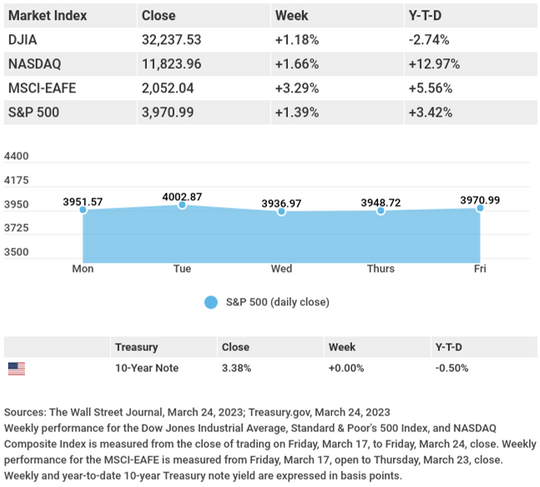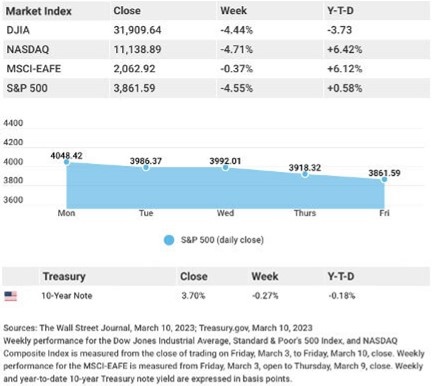Weekly Market Insights: Mixed Message Provokes Volatility
Modest gains in major market indices masked sharp volatility amid the uncertainty arising from mixed messages emanating from public officials and revived banking fears.
The Dow Jones Industrial Average gained 1.18%, while the Standard & Poor’s 500 added 1.39%. The Nasdaq Composite index rose 1.66% for the week. The MSCI EAFE index, which tracks developed overseas stock markets, advanced by 3.29%.1,2,3


A Turbulent Week For Stocks
The stock market was unable to find sustained direction as investors weighed comments from Fed Chair Jerome Powell and Treasury Secretary Janet Yellen. Stocks initially rose as banking fears eased following a deal to acquire a troubled Swiss bank. Optimism was further fueled by Yellen, who said the government could intervene to protect depositors if more bank issues materialized.
Enthusiasm faded, however, when Yellen subsequently testified that the Treasury was not working on any blanket insurance for bank deposits and by the Fed’s warning that banking turmoil could shrink lending access — the volatile week ended with sharp intraday price swings, shrugging off revived European banking concerns.
Rate Hike Cycle Ending?
Last week, the Federal Open Market Committee (FOMC) meeting was particularly noteworthy. Fed officials were placed in the difficult position of balancing the banking system’s opposing risks of still-high inflation and stressors. The Committee had considered leaving rates unchanged given banking stressors but unanimously voted to raise rates by 0.25%, citing elevated inflation, resilient economic activity, and a strong labor market.4
The official announcement hinted that the Fed might soon be done with raising rates while also stating it was too early to ascertain the degree to which the economy could slow from the current banking strains.5
This Week: Key Economic Data
Tuesday: Consumer Confidence.
Thursday: Jobless Claims. Gross Domestic Product (GDP).
Friday: Personal Income and Outlays. Consumer Sentiment.
Source: Econoday, March 24, 2023
The Econoday economic calendar lists upcoming U.S. economic data releases (including key economic indicators), Federal Reserve policy meetings, and speaking engagements of Federal Reserve officials. The content is developed from sources believed to be providing accurate information. The forecasts or forward-looking statements are based on assumptions and may not materialize. The forecasts also are subject to revision.
This Week: Companies Reporting Earnings
Tuesday: Micron Technology, Inc. (MU), Walgreens Boots Alliance, Inc. (WBA).
Source: Zacks, March 24, 2023

“Self-love is not a destination […] You’re always bucking against the current to just get back to the thing you were born with, which is a basic level of self-respect and self-love.”
– Melissa Viviane “Lizzo” Jefferson

Who Can File Your Taxes?
Many people file their taxes, but others choose to have a third party represent them. The IRS shares information about the different types of third-party authorizations that allow someone to represent you on its site.
- Power of Attorney – allows someone to represent a taxpayer in tax matters.
- Tax Information Authorization – appoints anyone to review or receive a taxpayer’s confidential tax information for the type of tax for a specified period.
- Third Party Designee – designates a person on the taxpayer’s tax form to discuss that specific tax return and year with the IRS.
- Oral Disclosure – authorizes the IRS to disclose the taxpayer’s tax info to a person the taxpayer brings into a phone call or meeting with the IRS about a specific tax issue.
*This information is not intended to substitute for specific individualized tax advice. We suggest you discuss your specific tax issues with a qualified tax professional.
Tip adapted from IRS.gov6

Two Delicious Juicing Recipes
Juicing is a fantastic way to add extra fruits and veggies to your diet. Some people might be hesitant to start juicing because they don’t have a juicer at home, but you can also make some delicious juice recipes in a blender. The two recipes featured here come from A Couple Cooks. You can make them with a blender.
Green Juice
Ingredients:
- Celery
- Cucumber
- Apple/Pineapple/Orange/Lemon
- Spinach/Kale
Instructions:
- Blend all the ingredients on high until pureed and smooth.
- Add 1 cup of ice and blend again.
- Strain.
Add water and blend again before straining if your juice is too thick.
Carrot Juice
Following the same instructions as the green juice, try these ingredients to make a delicious carrot juice:
- Carrots
- Apple
- Orange
- Lemon
You can add ginger, turmeric, or even garlic to give your juice more flavor and kick.
Tip adapted from A Couple Cooks7

Name three consecutive days without using the words Monday, Wednesday, Friday, or Sunday.
Last week’s riddle: Five girls took part in a bicycle race. Barbara finished before Vicki but behind Susan. Katarina finished before Sara but behind Vicki. In what order did they finish? Answer: 1-Susan, 2-Barbara, 3-Vicki, 4-Katarina, 5-Sara.


Sunset in the ancient city of Petra, Jordan.
Footnotes And Sources
1. The Wall Street Journal, March 24, 2023
2. The Wall Street Journal, March 24, 2023
3. The Wall Street Journal, March 24, 2023
4. The Wall Street Journal, March 22, 2023
5. The Wall Street Journal, March 22, 2023
6. IRS.gov, 2023
7. ACoupleCooks.com, 2023
6. Google Arts & Culture, November 20, 2022
| Investing involves risks, and investment decisions should be based on your own goals, time horizon, and tolerance for risk. The return and principal value of investments will fluctuate as market conditions change. When sold, investments may be worth more or less than their original cost. The forecasts or forward-looking statements are based on assumptions, may not materialize, and are subject to revision without notice. The market indexes discussed are unmanaged, and generally, considered representative of their respective markets. Index performance is not indicative of the past performance of a particular investment. Indexes do not incur management fees, costs, and expenses. Individuals cannot directly invest in unmanaged indexes. Past performance does not guarantee future results. The Dow Jones Industrial Average is an unmanaged index that is generally considered representative of large-capitalization companies on the U.S. stock market. Nasdaq Composite is an index of the common stocks and similar securities listed on the NASDAQ stock market and is considered a broad indicator of the performance of technology and growth companies. The MSCI EAFE Index was created by Morgan Stanley Capital International (MSCI) and serves as a benchmark of the performance of major international equity markets, as represented by 21 major MSCI indexes from Europe, Australia, and Southeast Asia. The S&P 500 Composite Index is an unmanaged group of securities that are considered to be representative of the stock market in general. U.S. Treasury Notes are guaranteed by the federal government as to the timely payment of principal and interest. However, if you sell a Treasury Note prior to maturity, it may be worth more or less than the original price paid. Fixed income investments are subject to various risks including changes in interest rates, credit quality, inflation risk, market valuations, prepayments, corporate events, tax ramifications and other factors. International investments carry additional risks, which include differences in financial reporting standards, currency exchange rates, political risks unique to a specific country, foreign taxes and regulations, and the potential for illiquid markets. These factors may result in greater share price volatility. This content is developed from sources believed to be providing accurate information. The information in this material is not intended as tax or legal advice. Please consult legal or tax professionals for specific information regarding your individual situation. This material was developed and produced by FMG Suite to provide information on a topic that may be of interest. FMG is not affiliated with the named representative, financial professional, Registered Investment Advisor, Broker-Dealer, nor state- or SEC-registered investment advisory firm. The opinions expressed and material provided are for general information, and they should not be considered a solicitation for the purchase or sale of any security. |

